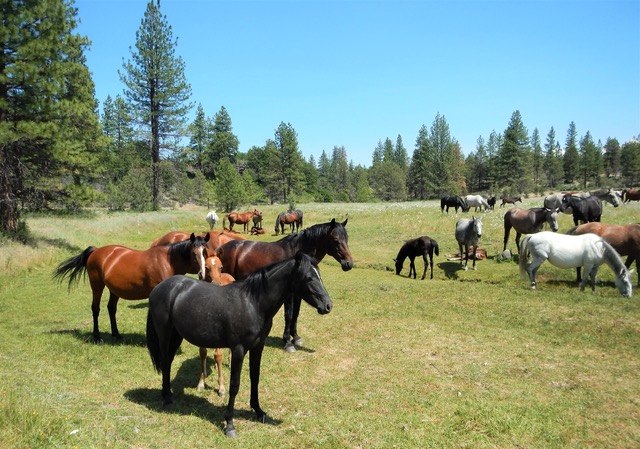Not Quite Right - Not All Herbivores Are The Same

More thoughts on how – and why – wild horses can improve habitat and reduce wildfire.
NOTE: this content below is written by, and published here with permission from, Capt. William E. Simpson II – USMM Ret. Naturalist – Author – Conservationist

A herd of wild horses in the Soda Mountain Wilderness have been using the same alpine riparian areas for centuries without ill-effects. Photo: William E. Simpson II
Recently, I read an article posted from the Canadian beef org ‘Grazing Forested Lands’, and I can certainly understand the economics behind their promoting the pseudo-science expressed in their article. But that dog don’t hunt!
Don’t mean to rain on their parade, but… that article just isn’t quite right!
So let’s correct the record with some facts that are consistent with settled, peer-reviewed science:
1) Cattle and sheep digest virtually all the seeds of the native plants they eat: FACT:
a) Influence of ruminant digestive processes on germination of ingested seeds; https://ir.library.oregonstate.edu/concern/graduate_thesis_or_dissertations/v405sg230
b) Ruminant Digestion: https://www.mun.ca/biology/scarr/Ruminant_Digestion.html
(Note: Horses pass most of the native plant seeds they eat back onto the landscape in their microbiome-rich droppings, which gives those seeds a strategic advantage over loose seeds laying on top of the soil)
c) The loss of native plant cover leads to less refreshment of the aquifer by precipitation and increased erosion of soils, resulting in poor water conservation.
d) The severe mechanical disruptions of soils by the hooves of cattle on forest floors and riparian areas is very damaging, and is seen in a side-by-side comparison to the impact of the hooves of horses in this article:
https://pagosadailypost.com/2021/01/18/opinion-wild-horses-chronic-wasting-disease-in-deer/
And both ‘c’ and ‘d’ lead to catastrophic erosion and the resulting excessive sedimentation of streams and rivers, and the redds (spawning beds) , thereby suffocating fish eggs and alevin in streams and rivers, which in turn adversely impacts populations of trout and salmon.
2) Cattle eat more of the forage that deer need, and cattle have a 4% grazing overlap with deer and other cervids; FACT:
Foods of wild horses, deer, and cattle in the Douglas Mountain area, Colorado. Hansen, R. M., Clark, R. C., & Lawhorn, W. (1977). Journal of Range Management, 30(2), 116-118. https://repository.arizona.edu/handle/10150/646893
(Note: Wild horses only have a 1% grazing overlap with cervids, compared to cattle with a 4% grazing overlap with cervids)
a) Wild horses are resistant to Chronic Wasting Disease (‘CWD’), which could potentially be transmitted between cervids (deer, elk, etc.) and livestock, as well as to humans who eat contaminated meat. In cattle CWD is called ‘BSE’ or mad-cow, in sheep it’s called scrapies. CWD is 100% fatal.
3) Wildlife (including birds and mammals) that have co-evolved in North America with native plants over millennia are adversely effected when the native plants, grasses and forbs they depend upon are stripped-off by livestock grazing, leading to a collapse of the diversity of native species in forested areas grazed by cattle, sheep or goats.
As a result of the foregoing, livestock should only be grazed outside critical wilderness areas, which can be managed using tilling and reseeding with desired plant and grass species.
MORE HERE: https://www.horsetalk.co.nz/2017/09/25/evolution-wild-horses-cattle-effect-range-damage/
Cattle and other ungulates are perfect for wildfire grazing in areas outside ‘critical wilderness’ where native species flora are vulnerable to serious loss by grazing cattle, sheep and goats.
Capt. William E. Simpson II – USMM Ret.
Naturalist – Author – Conservationist
Wild Horse Ranch
P.O. Bx. 202 – Yreka, CA 96097
Creator: Wild Horse Fire Brigade (www.WHFB.us)
Author @ HorseTalk (https://www.horsetalk.co.nz/author/billsimpson/)
Member: IMDb (https://www.imdb.com/name/nm6422679/mediaviewer/rm1090328832/)
Muck Rack: https://muckrack.com/william-e-simpson-ii
Check out my FilmFreeway account for films, studies, TV & radio interviews, and more HERE: https://filmfreeway.com/WilliamESimpsonII
